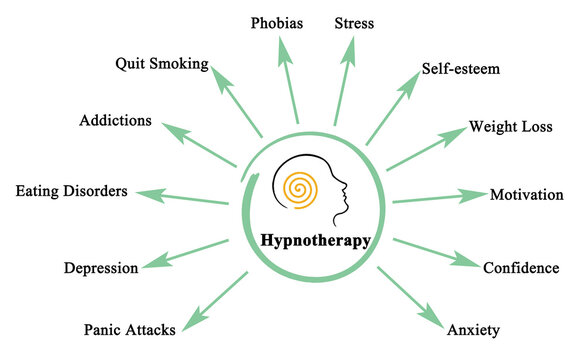
Did you ever consider if hypnosis might be the solution to all your troubles? Hypnotherapy has become popular as an alternative method of treatment for various conditions such as stress, anxiety, and even chronic pain. But does it really work? And more importantly, is it worth the price tag? In this article we will weigh up the pros and cons of hypnotherapy so that you can decide whether or not this type of treatment is right for you. Let’s take a closer look at what exactly hypnotherapy involves and some points to think about before making any decisions.
What are the benefits of hypnotherapy?
Hypnotherapy offers benefits such as stress reduction, improved sleep, and assistance with behavioral changes like quitting smoking. It can also help manage pain and anxiety. Its value is enhanced when combined with other therapies, addressing both psychological and physical aspects for comprehensive health improvement.
It allows mental clarity and emotional well-being through relaxation and focused attention. Some clients even report that they have more motivation and confidence after sessions. Hypnotherapy helps overcome fears and bad habits by working on the subconscious patterns set within. Since treatment is customized, therapy is tailored to the needs of clients and represents good value for money.
How does hypnotherapy compare to traditional therapy in cost?
Hypnotherapy costs can vary, often comparable to traditional therapy, with sessions typically ranging from $75 to $200 each. The overall expense depends on the number of sessions required.
Though this may be a little costly in the beginning, hypnotherapy is found to be much faster compared to other forms of therapy and can therefore save a lot of money in therapy bills later on. And the cost per session, hypnotherapy’s efficiency can make it an economical solution over some time.
Fewer sessions might be needed by the client to drive home a desirable result compared to conventional therapy. This again will depend on the experience of the therapist and the kind of problems being treated as these are the determinant factors of cost and effectiveness.

Is hypnotherapy covered by insurance?
Hypnotherapy coverage varies by insurance provider and policy. Some plans may cover it for specific conditions like chronic pain or PTSD when deemed medically necessary.
It’s important one inquires from their insurer whether such services are billable for consideration of whether or not documentation can be submitted to the HMO for recompense. Patients who have insurance and wish to undergo hypnotherapy may want to know exactly how unlimited their policy can cover such treatments because not all insurance companies can reimburse a hypnotherapy approach.
And if they do, they require such documents to prove its therapeutic need. One can consult healthcare providers and insurance companies to be able to understand the coverage issues for informed decisions.
How many hypnotherapy sessions are typically needed?
The number of hypnotherapy sessions needed varies based on individual goals and issues, typically ranging from four to ten sessions. Some clients may experience significant benefits after a few sessions, while others require more.
Individual treatment plans result in sessions being relevant to the individual need and what the client is looking for. Factors that can influence the number of sessions required include the severity of the problem, the receptiveness of the client, and the style of the work. free initial consultations are provided to give an indication of the number of sessions that may be required. Clients are always encouraged to take an active part in their progress, which can impact the length of time and success rate of treatment.
What factors affect the cost of hypnotherapy?
The factors that affect the cost of Hypnotherapy are practitioner experience, session length, location, and treatment complexity. Experienced practitioners often charge higher fees, and urban areas may have higher rates.
The amount of sessions that one has and other services provided to the patient will bring in the cost of treatment. Finally, they must consider the qualifications and specializations of the practitioner since better qualifications and specialization often translate to higher effectiveness and, of course, cost.
More complex problems may necessitate more sessions and drive up the total cost. It may be a good idea to look around and ask about service bundles and sliding scale fees to get a better idea of how to find the most cost-effective approach to an individual client’s needs.

Can hypnotherapy provide long-term benefits?
Hypnotherapy can provide long-term benefits by addressing subconscious patterns and promoting behavioral change. It fosters lasting improvements in areas like stress management and confidence.
Success depends on the commitment of the individual and the practitioner’s skill; many clients have reportedly made positive changes that were sustained after treatment. The skills one learns during a hypnotherapy session enable them to handle stress and emotions independently.
The effects of hypnotherapy techniques applied remains permanently. Hypnotherapy is most effective and has long-lasting positive effects on those patients who are active, committed to the follow-up, and keep on administering lifestyle change interventions after the treatment.
Is hypnotherapy worth the investment for mental health?
Hypnotherapy can be a valuable investment for mental health, offering personalized treatment and targeting subconscious issues. It complements traditional therapies and can lead to quick results in stress and anxiety management. Its worth is best determined by individual needs and response to treatment.
Hypnotherapy has become very popular with clients who feel that conventional modes of therapy are not enough. It could even be said that it offers a type of holistic supplement to conventional lines of therapy by identifying emotional and psychic patterns that it is hard to address otherwise. For maximum benefit, hypnotherapy should be conducted only after consideration of personal goals, extant treatment plans, and the expertise of its practitioner.
The Short Note
Overall, there are quite a number of possible benefits that come along with using this method but like anything else it does have some downsides. Therefore before making any decisions it would be best if you considered both sides carefully in light of your situation and needs then make an informed choice whether to go for it or not.
To determine if the Hypnotherapy treatment is suitable for your health goals and budget one must first evaluate their current circumstances alongside what they hope to achieve from such interventions. Keep in mind that every person’s wellness journey is different therefore finding what works may take some trial and consultation with professionals until eventually settling on what feels right for oneself.
